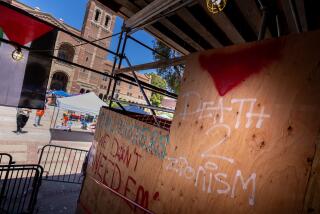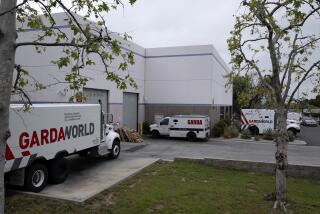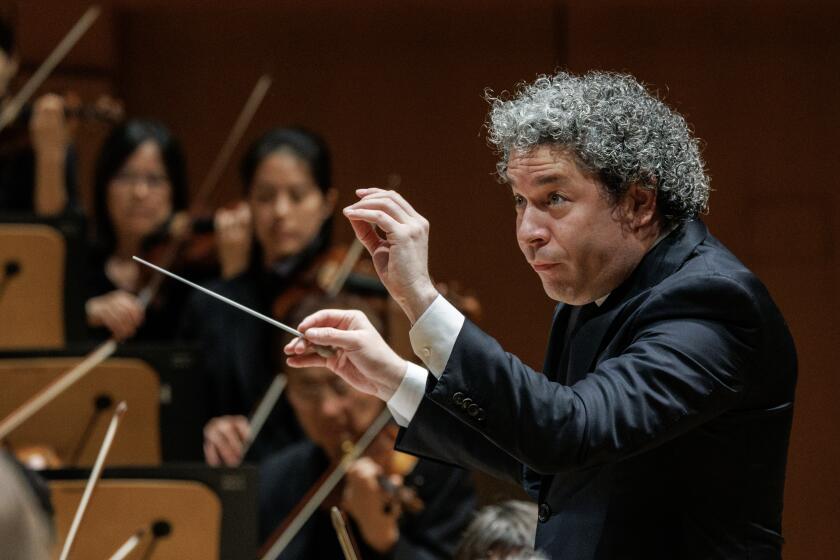Brando Case Is a Natural for Kunstler : Justice: Famed civil liberties lawyer responded quickly to request from famed actor and fellow ‘movement person’ to defend son against murder charge.
The 2 a.m. telephone call jarred William M. Kunstler out of a deep sleep in his West Village apartment in New York.
Marlon Brando, an old friend, was on the line. According to Kunstler, the famed actor called on May 18 even as homicide detectives were searching Brando’s 12-room house in the Santa Monica Mountains. They were combing for evidence to use in a murder case against the actor’s son, 32-year-old Christian Brando.
“Bill, something terrible has happened,” Brando said. “You’ve got to help me.”
The well-known civil liberties lawyer had a court appearance later that day in New York on behalf of 200 protesters arrested during an Earth Day demonstration on Wall Street. But Kunstler rescheduled the arraignment and flew to Los Angeles.
Once again, say those who know Kunstler, the 71-year-old courtroom legend was being tugged by two consuming, and sometimes competing, passions--his ardent desire to defend the rights of those he sees as underdogs and his love for the spotlight.
“He really does have a good reputation as a lawyer, but he really is a show person too,” says former California Supreme Court Justice Cruz Reynoso, echoing the sentiments of many who know Kunstler.
“Incidently, that’s not a bad thing for a lawyer,” Reynoso added. “. . . Knowing how to deal with the press is part of your job as a lawyer if you are going to handle high-visibility cases.”
To his admirers, Kunstler, who has led the defense in nearly 100 homicide trials, is a folk hero, a believer in justice and a brilliant cross-examiner who has honed his skill in rough-and-tumble New York courtrooms. His detractors depict Kunstler as an egotist who belittles judges and plays to the media more than to the juries and judges who pass judgment on his clients.
“I’ve heard the same criticisms about F. Lee Bailey,” Kunstler replies. “When you are a little prominent you get sniped at a little--but that is part of the turf. I don’t take it too personally.”
Beyond that he said: “Martin Luther King taught me one great lesson. Never answer criticism. It’s stupid to do that. If you are a good lawyer, you’ll do well.”
Soon after he had arrived in Los Angeles last week to defend Christian Brando on charges of fatally shooting his half-sister’s boyfriend, Dag Drollet, 26, Kunstler had already stirred up controversy. After a Municipal Court judge in West Los Angeles dismissed his plea for bail for the jailed Brando, Kunstler chastised Judge Rosemary Shumsky for “sitting up there like a toad without taking a single note and then saying there is no basis for bail.”
Then, on Friday, Kunstler took time off the Brando case to appear in a movie directed by Oscar-winner Oliver Stone about the renegade 1960s rock group, The Doors. In the film, Kunstler plays the role of an attorney who defends the group’s lead singer, Jim Morrison, against charges of indecent exposure.
That should be a natural performance for an attorney who has been defending seemingly hopeless cases and skewering judges--most famously in the Chicago Seven conspiracy trial 20 years ago, when he mocked the late federal judge Julius Hoffman’s reading of indictments. Hoffman, Kunstler said, sounded like “Orson Welles reading the Declaration of Independence.”
“He shoots from the hip, well, maybe the lip, but he tells it like he sees it and never minces words,” said private investigator Pat Richartz, who worked with Kunstler on the Chicago Seven trial, which followed the Democratic National Convention in 1968. “When I heard about the Brando case I knew Bill would be there unless he was in the hospital connected to tubes.”
Kunstler, whose eyeglasses propped up over his shock of wiry gray hair became a familiar television news image in the late 1960s and early 1970s, first met Marlon Brando, whom he describes as a fellow “movement person,” when they crossed paths at an American Indian uprising at Wounded Knee, S.D.
“I first met Marlon at Wounded Knee in 1973,” Kunstler said. “I only see him during very intense periods.”
“Marlon Brando has been one of the few people in Hollywood who has consistently supported civil rights causes at great risk to himself when they weren’t popular and where the threat of violence was great,” added Ron Kuby, Kunstler’s associate in the case. “We would come to the defense of anybody with that track record.”
Kunstler, who received a Bronze Star from the U.S. Army for his service in the Southwestern Pacific during World War II, has gone to the mat in similar situations throughout his 42 years of practice.
These cases--and Kunstler’s penchant for publicly challenging authority figures--have thrust him into the ranks of such celebrated defense attorneys as Bailey, Melvin Belli, Clarence Darrow, Marvin Mitchelson and Richard “Racehorse” Haynes.
He has been a special trial counsel to the Rev. Martin Luther King Jr., defended Freedom Riders and Black Panthers and was involved in negotiations after a bloody shoot-out at the Pine Ridge reservation in South Dakota between militant American Indians and federal agents. More recently, he defended Clayton Lonetree, a Marine sergeant accused of espionage, and Revolutionary Communist Party members accused of burning an American flag.
Now, in a rare break from defending “movement people,” Kunstler has taken up the cause of Marlon Brando’s son, who claims he was drunk when he confronted Drollet with a gun over alleged mistreatment of his half-sister, Cheyenne Brando.
Brando, a part-time welder, has pleaded not guilty to one count of murder, one count of illegal possession of an assault rifle and one count of illegal possession of a silencer.
Kunstler says that the fact that Brando’s blood-alcohol level was 0.19%--more than twice California’s legal limit of intoxication for motorists--bolsters his argument that the shooting was an accident.
“The highest charge I can think of in this case is manslaughter,” Kunstler said. Such a charge, he added, requires bail. Brando was denied bail on the murder charge despite sworn declarations about his good character filed with the court from 18 supporters, including actor Jack Nicholson.
Kunstler’s public anger over Judge Shumsky’s decision to deny bail to the younger Brando drew shrugs from the prosecution.
“I don’t care what he says. He is of no consequence to me,” said Deputy Dist. Atty. Steven Barshop. “The people intend to prosecute this case with dignity and class.”
But to Kunstler, it was another judge who needed to be taken on.
“It’s good for these judges,” he said. “I don’t think you get anywhere by bending a knee to them. I believe in attacking. . . . They are dealing with human rights and they can’t expect to avoid criticism.”
More to Read
Start your day right
Sign up for Essential California for news, features and recommendations from the L.A. Times and beyond in your inbox six days a week.
You may occasionally receive promotional content from the Los Angeles Times.







